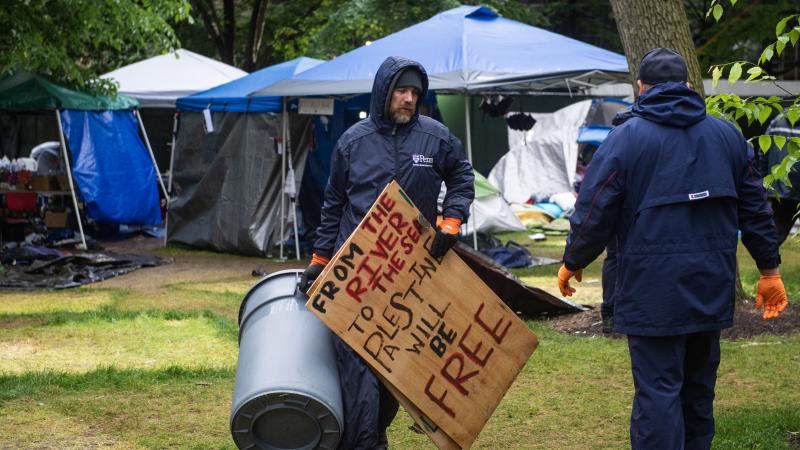Supporters of controversial ‘environmental accounting’ decline to participate in House hearing
Rep. Harriett Hageman, R-Wyo., said that advocates of regulations that would have such a wide impact should expect a high level of scrutiny and shouldn’t participate in these kinds of policy discussions if they’re not comfortable with tough questions.
A House Natural Resources oversight subcommittee hearing Thursday examined initiatives to create regulations allowing for controversial accounting methods that subjectively assess the value of environmental capital – a large departure from traditional accounting practices and regulations.
No proponent of the concept appeared on the panel of witnesses. Rep. Melanie Stansbury, D-N.M. said Democrats had invited proponents to testify, but they all declined over concerns over how they’d be treated at the hearing.
Following a backlash, the Securities and Exchange Commission (SEC) in January backed off a plan to create “natural asset companies,” which would have established a regulatory framework to monetize markets in ecosystem services. These services would effectively place value on public lands solely in terms of subjective environmental values, which means no objectively measurable economic output.
Proponents argue that these practices allow for improved natural resource management, performance, and outcomes as well as improved assessment of business sustainability. Critics argue that the system is ripe for abuse and would take large amounts of public land out of consideration for economic benefits.
No minority witness
Stansbury said that Democrats had invited several witnesses to speak in support of natural capital accounting, as it’s sometimes called, but the experts declined the invitations due to a “lack of respect and partisanship” that Stansbury said had been shown to witnesses in hearings in the past.
“I fear that we will not get the whole story today because some of our witnesses were not willing to come here and be berated by congressional members,” Stansbury said.
Rep. Harriett Hageman, R-Wyo., countered that advocates of regulations that would have such a wide impact should expect a high level of scrutiny and shouldn’t participate in these kinds of policy discussions if they’re not comfortable with tough questions.
“When you're attempting to literally take trillions of dollars of value out of our economy, perhaps you should be subjected to difficult questioning,” Hageman said.
Kathleen Sgamma, president of the Western Energy Alliance, also remarked on the absence of a minority witness. This included David Wilkinson of Yale University who was listed as a minority witness but did not appear at the hearing.
“This individual is, as far as I can tell, the leading proponent of natural capital accounting,” Sgamma said, “If academia can't attend to defend its academic ideas, that they can't be challenged. So I think that's kind of telling about the sad state of academia today.”
Wilkinson did not reply to requests for comment.
Subcommittee Vice Chair Mike Collins, R-Ga., said the lack of any minority witnesses was a reflection of the Biden administration. “They don't really care what you think. They don't care what the implications may be on you, or anybody in your area or in your community,” Collins said.
Beauty of nature
Whereas traditional accounting practices and standards, such as General Accepted Accounting Principles, are grounded in economic activity, Utah Treasurer Marlo Oaks explained, ecosystem services and natural capital accounting involve a lot of subjectivity. Such standards would assess valuations based on an aesthetic value, such as the value of a sunset.
“There is no underlying economic activity associated with ecosystem services. That's not to say that it isn't valuable. We have always valued ecosystem services. But the question is, how do you deal with something that does not really have economic activity underlying it?” Oaks said.
It would be anyone’s guess what the real value of these assets would be, Oaks said, and that would be a system ripe for exploitation by bad actors.
“We open the door to subjective interpretations and potential abuse. These efforts circumvent legislative processes and threaten the livelihoods of those who rely on multiple-use economic activities,” Oaks said.
The proposed SEC rule that was withdrawn, Sgamma said, was intended to prioritize sustainable use on public lands over productive uses, like ranching, mining, and energy development.
“What you’re left with is some kind of qualitative assessment of the value of a bird call or the beauty of nature,” Sgamma said.
No local input
Ross Butcher, a commissioner for Fergus County, Montana, testified about proposed Bureau of Land Management rules for conservation leases, which he said are ancillary to the accounting concept of natural assets.
Conservation leases would allow public land to be leased in the same way as leases are conducted for mineral exploration and development, or oil and gas drilling. Except with conservation leases, the land would be leased for “restoration or protection purposes,” effectively barring almost all economic activity upon it.
These proposals, Butcher said, are being developed with little input from the local jurisdictions they’re going to have substantial impacts on. This kind of input, he said, has knowledge of local conditions that could benefit policymakers. He said he’s worked with BLM employees in the field offices who aren’t comfortable carrying out directives that come from above.
“The real issue comes when you start seeing top-down delegation, pushing those local land managers to make decisions that they themselves know are not healthy for the range,” Butcher.
The conservation leases would, Sgamma argued, lead to a collapse in revenues from resource development.
“I would add that, since we in the oil and natural gas industry provide 94% of the revenue for conservation that comes from the Great American Outdoors Act, you'd also have a collapse of conservation funding on federal lands,” Sgamma said.
Hageman said that the way the draft conservation leases rule is set up, the BLM could theoretically lease all 245 million surface acres under its control to billionaire Bill Gates, anti-fossil fuel crusader and billionaire Michael Bloomberg, or to China, which has an interest in blocking off U.S. land from economic development.
Subcommittee Chair Paul Gasar, R-Ariz. commented that the criticisms of these proposals are branded as being in opposition to the concept of conservation. He asked Oaks about his feelings toward the importance of preserving and protecting lands.
“In the West, we are the original conservationists. I mean, this is the land that we grew up on. And the people who are closest to the land care about it the most. It's the farmers and the ranchers and the people that are in rural communities. This is their livelihoods,” Oaks replied.
















